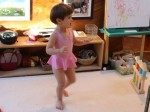Your Brain, Your Child’s Brain and What To Do About It
The young child has a brain different from ours – like, totally different. And yes, it’s scientifically-proven.
Here’s an example: if given the right environment, children can learn 4 languages simultaneously, and understand all of them by the time he’s 3.
Because we have different brains, we learn differently. Children absorb everything in their environment – effortlessly, easily, unconsciously. We, unfortunately, don’t learn that way.
One brain is not better than the other. But, as you can see, we are totally different. Here’s another example:
Children are sensorial learners. That means they learn through their senses. A child who rips a book is fascinated by the feeling of paper ripping and crumbling in his hands. A child puts his fingers in his drinking cup and swirls it around because he’s experimenting with water. A child making a mess at meals is because he’s learning how to eat.
Now, from our point of view, as the parent who has to tape up the book, wipe up the water and clean up the mess (along with the six zillion other things we have to do as a parent), it could look like he’s screwing around, doing it on purpose, or maybe, he’s spoiled and ‘bad.‘ With our logical, rational adult minds, we make these kinds of assumptions.
So there’s the child’s brain – and then there’s the adult brain. Two totally different brains, trying to co-exist.
Because the adult is bigger, Mom and Dad can dominate the child and physically remove him from anything they don’t want him doing. But the child! The child is driven to learn. In fact, that internal force is so strong, deep and instinctual, his whole existence depends on it. Therefore, just so you know, the next chance he gets, he’ll probably do it again.
So we essentially have two choices. We can overpower the nature of the child (and watch those wrinkles and gray hair proliferate) OR we can align ourselves with it.
Here’s what happened to me a while back. So it’s bathtime. B and M are playing in the tub with their various water containers, pouring water from one container to another. Well, someone came up with the bright idea of pouring water outside of the bathtub and onto the floor. The first time this happened, my husband came in yelling, “No water outside the bathtub!” then grabbed both of them out of the bath and ‘made them’ clean it up (except with two-year-olds, they love to clean and eagerly fetched the towels to clean – so it wasn’t the punishment Mark had in mind). Of course that didn’t stop them the next day (and the next), when we again, promptly took them out of the bath, shook our fingers at them and raised our voices to teach them a lesson.
Until I realized this: they love water. They love pouring water. Trying to stop them is like trying to stop a seed from growing or the sun from coming out in the morning.
So I decided to align myself with Nature instead.
The next day, while the girls were in the bath, I took out a large empty garbage can and put it next to the bathtub. I told them, “If you want to pour water, you can pour it into the garbage can. See if you can do it without spilling any on the floor!”
It worked. They immediately filled up that big garbage can with cups of bath water. Carefully, too. I then dumped out the water in the toilet. And then they proceeded to fill it up again. Before they were halfway through the second round, they had already lost interest and started playing with their sea animals.
Children will want to play with water all the time. They will drip, dribble, grab and smear while eating. They will want to touch everything. They will run around and climb on everything. They will sing and talk loudly, even when it’s inappropriate. That is their Nature. You can come down on them, punish them, manipulate them, distract them (and I’ll admit, there are a few moments when you might need to do these things). But consider working with Nature, at least most of the time. Find creative ways for them to get their needs met. They are going to follow their nature, whether you like it or not. So find a way so they CAN do the things they want to do: let them walk around freely in a new environment and touch things (they are capable of learning how to stay away from danger and handle fragile things), give them something they can climb on in the house, give them stacks of paper to rip, let them play with water that extra 20 minutes at the sprinklers/sink/bathtub, etc.
When you hear yourself saying, “No!” or “Don’t do that!” mostly, I suspect, it’s because you’re not aligned with the Nature of the child. So whatever you’ve got to do, figure out a way to align yourselves, my friends. It’s your path to peace and sanity.
**To read a free excerpt of my new book, Raising Your Twins: Real Life Tips to Parenting with Ease (Without Kicking Your Spouse to the Curb), click here and download it to your Kindle or to your computer. Look for the “Try It Free” box!












I love this post because it is very true. I have a very curious 2 year old. Sometimes he is testing boundaries but most of the time when I am most frustrated it is because I am trying to contain or control him. It struck me recently that I was getting more angry more often, so now I try to look at the situation from a different angle and work WITH him. Everything relaxes and life is easier.
That’s awesome, Kay! Thank you for sharing this.
Thanks very much. Very good read and i agree sometimes going with the flow works better. I am wondering whether you can give me some tips between going with the flow, or spoiling them. Sometimes people say if you let your kids mess about and play with this and that, when normally you wouldn’t ie water all over the place etc, you will spoil them. I need help defining that boundary. Thanks!
This depends. How old is your child?
Thank you for reminding of an important ideal that I have forgotten recently. I’ve been tired, sick and busy lately and I’ve been saying no a lot. I became interested in Montessori because it teaches us to “follow the child”. I’ve been so caught up in adult work that I forgot to let him do his work, which is to learn through play.